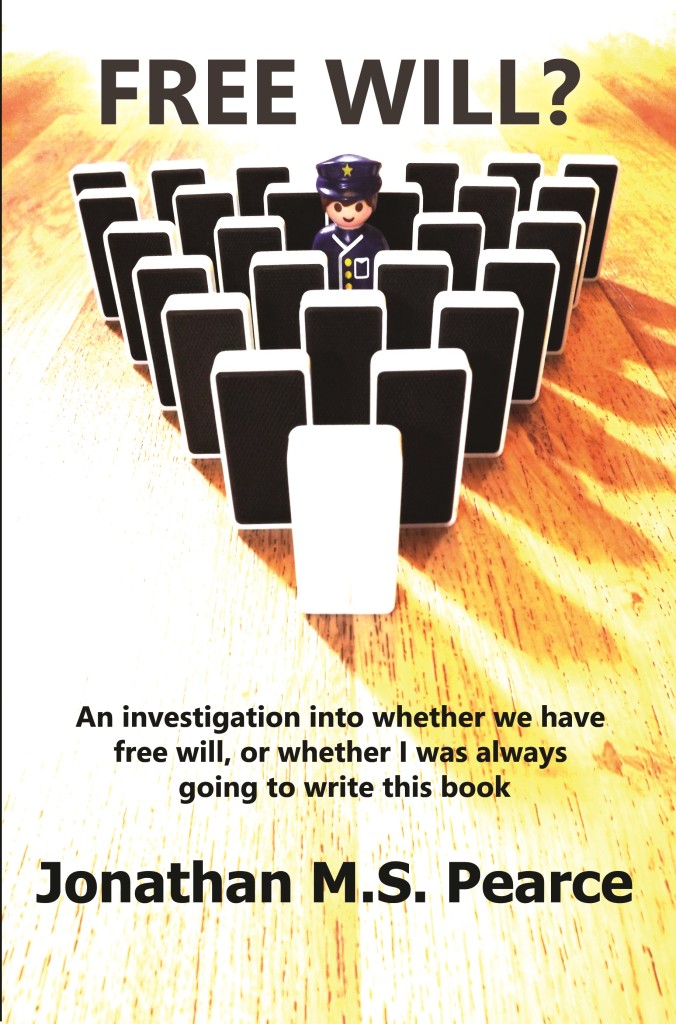It’s that time of the year, my friends! Almost. Anyway, let me try to persuade you to part company with some hard earned cash in support of my projects and books. This is partly a reblog of Caleb Lack’s post some time ago over at the superb Great Plains Skeptic here at SIN (so the first part is written from his point of view):
Despite the fact that most scientific skeptics do not find themselves formerly associated with a religion, this time of year tends to nonetheless bring out the giving spirit in many of us. Although Tom Flynn wouldn’t approve, many of us celebrate (in a secular fashion) Christmas, or Kwanza, or Festivus, or the Solstice, or Hanukkah, or just like to give presents because it’s fun. With that in mind, I’ve linked below some potential gifts that many a person reading this might want to either give or receive. Each is (in part or whole) the work of one of the Skeptic Ink Network’s fine writers, so you’re not just giving a great gift, you’re helping out a great person.
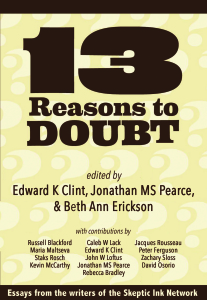 First up is 13 Reasons to Doubt
First up is 13 Reasons to Doubt, the first book from the Skeptic Ink Network. It contains 13 chapters by various SIN bloggers (including myself) and has received quite positive reviews in the press. As I said when it was released:
…this is a very solid book. The topics are very wide ranging (as befits the diversity of the authors) and covers topics outside of the “typical” skeptical ones (e.g., what some people deride as “Bigfoot skepticism”). Instead, you have philosophers, archaeologists, psychologists, anthropologists and more discussing topics from why skepticism is important to cognitive biases to science denialism and more. My personal favorite chapters are those by Russell Blackford and Jacques Rousseau, who both happen to be philosophers and skeptics.
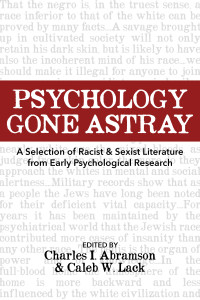 Next (because, after all, I’m the one doing this) is my latest book – Psychology Gone Astray: A Selection of Racist & Sexist Literature from Early Psychological Research
Next (because, after all, I’m the one doing this) is my latest book – Psychology Gone Astray: A Selection of Racist & Sexist Literature from Early Psychological Research. As I said in an interview about the book’s release:
The book addresses an often-ignored issue in psychology: how the results of numerous poorly conducted psychological studies were used to support and justify both scientific and institutionalized sexism and racism….If we do not learn how to spot such dubious research and results, we will likely fall prey to such problems again and again.
I also talked about what we uncovered in our examination of early psychological research in a podcast with the Blue Ball Skeptics, or you can read a sample in this previous post. If you’d like to get any of my others books (with me as solo author or contributing a chapter), just head over to my Amazon author page.
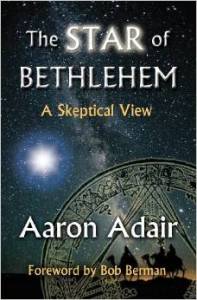 Next up is The Star of Bethlehem: A Skeptical View
Next up is The Star of Bethlehem: A Skeptical View by Aaron Adair (who often writes for the A Tippling Philosopher blog on SIN). As I said when I reviewed it:
Adair writes in clear, concise prose, which is very helpful when you are reading about a scientific field that you have little to no training in. My formal experience with astronomy is minimal, although I do own a telescope and host the occasional star-gazing party…. Nonetheless, despite my ignorance of the field, I never felt lost or confused when reading SOB.
Adair is a clean writer, without the superfluousness that sometimes plagues writers early in their career. In terms of content, Adair does a great job at covering all bases. The book is broadly divided into three sections (The Story, The Hypotheses, and Fatal Problems), with the majority of the book examining the specific natural hypotheses that have been proposed over the centuries to explain the story of the Star as told in the Gospel of Matthew (and only that particular gospel, something many people don’t know).
I n addition, also in the spirit of the season, Jonathan Pearce (mastermind behind ATP) has a book entitled The Nativity: A Critical Examination
n addition, also in the spirit of the season, Jonathan Pearce (mastermind behind ATP) has a book entitled The Nativity: A Critical Examination that does a very thorough job collating the various scholarship on aspects of the Nativity story that we are familiar with (and yet, which doesn’t actually appear in any of the gospels). From the back of the book:
The nativity of Jesus is an event that carries much cultural recognition. However, is it a narrative which commands much support in the academic world? Is it a story which holds much historical truth? Or were the two biblical accounts of the birth of Jesus an opportunity for the authors to impart a theological truth or otherwise?
These are the sort of questions that are often asked of the nativity accounts and questions which are answered in this concise and yet well-researched and informative book. Some twenty arguments are looked at and presented in a clear and detailed manner, building a cumulative case for the objection to the historical nature of the Gospel accounts. The author also questions what purpose these stories do serve if indeed they do carry little or no historical truth.
With reference to a wide array of contemporary and iconic works on the subject, Pearce has created a compendium of critical arguments against the historicity of a story which still remains a vital piece of our collective cultural and religious tapestry.
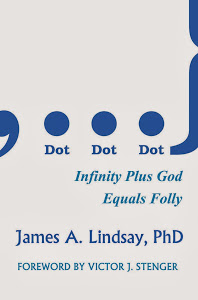 James A. Lindsay, a mathematician who also contributes to ATP, recently published a book titled Dot, Dot, Dot: Infinity Plus God Equals Folly
James A. Lindsay, a mathematician who also contributes to ATP, recently published a book titled Dot, Dot, Dot: Infinity Plus God Equals Folly:
Infinity and God have been close bedfellows over the recent millennia of human thought. But this is James A. Lindsay’s point. These two ideas are thought, mere concepts. Lindsay shows in a concise and readable manner that infinity is an abstraction, and shows that, in all likelihood, so is God, particularly if he has infinite properties.
This book is about math. It is about God. It is about stressing the importance of not confusing these two ideas with reality. Never the twain shall meet.
“A short and engaging read on the meeting of two huge ideas, infinity and God, that leaves us seeing both as abstract ideas that may have nothing to do with reality. Honest and accessible, Dot, Dot, Dot is a great little book to stretch your thinking.” – Peter Boghossian, author of A Manual for Creating Atheists
 And, if you’re just too broke to buy anything but still have access to a printer and ink, you could always just make and hand out these amazing Carl Sagan / Skeptic Ink papercrafts!
And, if you’re just too broke to buy anything but still have access to a printer and ink, you could always just make and hand out these amazing Carl Sagan / Skeptic Ink papercrafts!
Back to me, Jonathan Pearce. Let me add a few more options for you. If you are interested in and introduction to the age-old debate over whether free will exists, then there is always my book Free Will? An investigation into whether we have free will or whether I was always going to write this book. Here is one of the latest reviews:
Jonathan Pearce has written what is quite possibly the most detailed explanation of the problems with free will. He covers philosophical, scientific, and theological issues that conflict with humans being the author of our choices.
I would recommend this book to free will believers who are Christians because they will find familiar concepts that will teach them more about their own beliefs as well as that of others.
Particularly interesting is the parts about Calvinism and Molinism. I learned some thing I didn’t know before.
But the final reason that free will is impossible has nothing to do with religion. Determinism cannot be escaped for the atheist either. This is a book for everyone.The fifth part of the book is about the concepts of morality, responsibility, and the purpose of punishment. For the determinist, punishment can only serve as a correction for criminals to ensure that they do not repeat the crimes. Any feeling of retribution is gone for those who see free will for the illusion that it is.
Next up is my latest book, an ebook only amalgamation of arguments from this blog with some original extras, al at a very reasonable price. It is called The Problem with “God”. The arguments look to debunk the notion of God as defined in classical theism: omni this and omni that. Let my first reviewer give their opinion: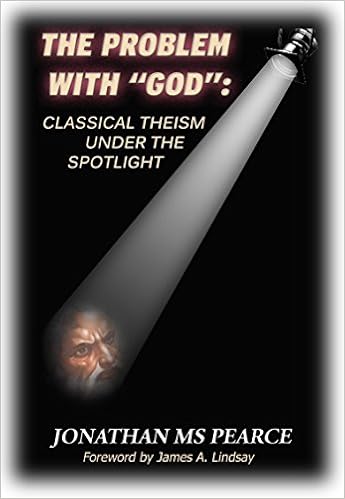
Think of this as Jonathan Pearces greatest hits all compiled together. He is one of the most interesting and convincing philosophers of modern times. Some of my favorite posts are here, which I have at my fingertips when I need its resource.
It was somewhat difficult to read this on my phone, I don’t usually read kindle books, I prefer old school books, but I managed to just finish it.
These blogs are fascinating, deep and well written and persuasively convincing of why theism fails on several accounts. The choice of topics are amazing, and no one can deliver this as good as Pearce can.
If you are a Christian, you won’t find this book rude or obnoxious, it is fair, well balanced and I encourage you to give it a chance. Challenge yourself, for no one will challenge you better than Johnny can.
Excellent selection and content, and Johnny hits another home run.
And then there is The Little Book of Unholy Questions, the cumulative case against the existence of God written as a series of question directly to God. These are grouped into sections which I introduce, giving more depth to the areas. Here’s what Julian Haydon had to say:
Five stars squared for this little book, dynamite in a small package!
How devastatingly powerful are simple questions presented so clearly and respectfully. Pearce says in few words what others take books to do. Though not a scholar, I have spent years pondering some of these questions but very many caused me to wonder, “Why did I not think of that, it is so obvious?”
How many of the scores of millions of intelligent and well-meaning Christians would be simply astonished and incredulous to find that nearly all of these questions arise from both the Old and New Testaments and Christian doctrine?
In fact, for those millions of Christians who have only read parts of the bible — and anyone else — this little book of 211 pages is a great way to become aware of what is really in that great and obscure haystack.
Pearce explains the standard defenses for what seems indefensible for a loving-merciful-forgiving God: free will, character building, original sin, heaven balances the scales for injustices, and ours not to know the ways of God, with a few words of comment.
Who will dare to answer these questions anywhere, much less as concisely? C. S. Lewis might have tried but he is long dead. Nevertheless they will not go away.
Do yourself a favor — read it.
 I have recently ventured out with Rebecca Bradley, author and blogger here at SIN at Lateral Truth, into the world of fiction publishing. Our first project was her own new book which is called Cadon, Hunter. It’s a great read, and does deal with religion, destiny and early society with subtle brilliance. Here is my short review of the book:
I have recently ventured out with Rebecca Bradley, author and blogger here at SIN at Lateral Truth, into the world of fiction publishing. Our first project was her own new book which is called Cadon, Hunter. It’s a great read, and does deal with religion, destiny and early society with subtle brilliance. Here is my short review of the book:
I whistled through this book, testament to the writing and the pacing in Bradley’s first in hopefully further instalments. Bradley is a good writer. You can easily say that and have the sentence passed over as a mere generalised statement. But I mean it. She writes very well, characterising with aplomb, nailing the point of views of each person in the story and giving you something on every page.
Bradley has a history in, well, history (of the ancient kind) with her background in archaeology. This shines through with her hypothesising of rituals, events, clothing, language, culture etc. This adds to what is a rich tapestry of storytelling, interspersed with some dry humour, which keeps you turning the pages breezily because those ideas and nuggets are interwoven seamlessly. There are some fascinating elements of early religious thought and criticism as the societies of the established culture comes into clash with the People, the wondering hunter gatherers which certainly piqued my interest.
In sum, it is a darkly funny clash of ancient cultures and I hope Bradley continues to write further stories in what could be a great series.
Finally, let me remind you of the anthology of deconversion accounts edited by myself and Tristan Vick called Beyond an Absence of Faith. These came from a great variety of sources from around the world and with a good gender balance.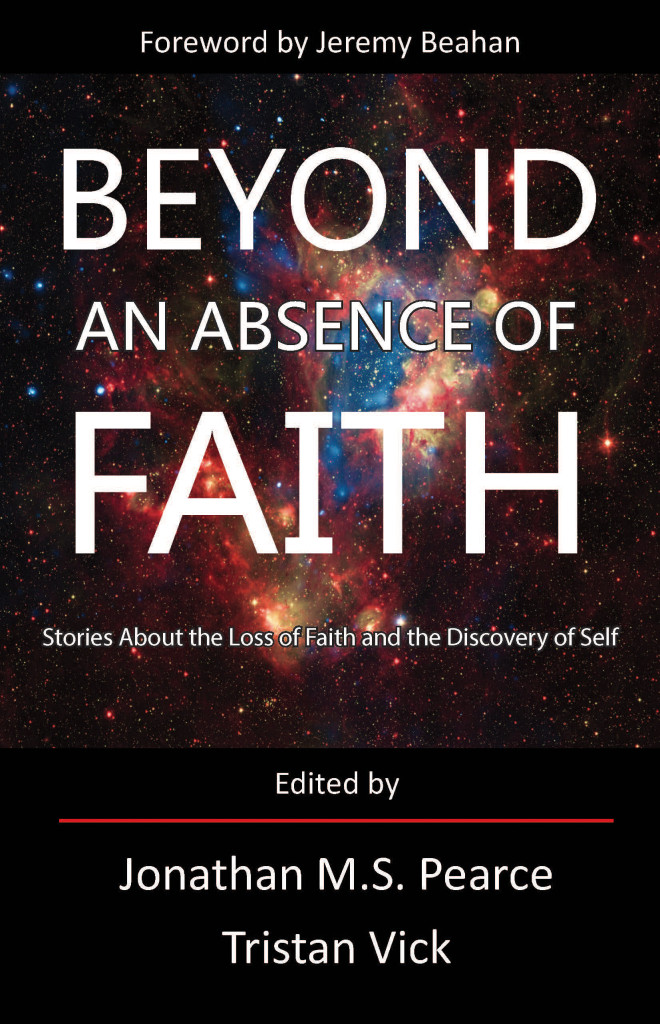
Pearce and Vick have brought together a diverse group of voices with one thing in common – they have moved beyond being “former believers” into being active participants in humanity. Each of the stories shared is unique, but former believers will find something they can identify with in every one. From the pain of separation from friends and family, to the joy of being liberated from a sexist mindset, to the harsh reality of having to find a new career in the middle of your life because you have embraced reason, these personal stories help to reinforce for the non-believer that you are not alone in your journey. Instead, you are walking a path many have gone down before, and you can take solace in knowing that these authors have been there as well.

